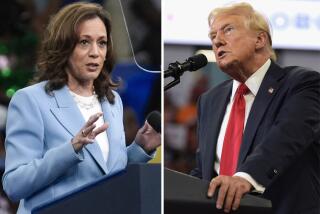Gore Hopes to Bear Down on Contrast With His Rival
- Share via
WASHINGTON — With his rival for the Democratic presidential nomination showing no sign of fading, Vice President Al Gore plans to sharpen his focus on policy differences with Bill Bradley in the next few weeks leading up to the crucial contests in Iowa and New Hampshire, campaign officials said Thursday.
They hope that this new intensity will allow Gore to play to what they see as his political strength: the economic progress that has occurred during the Clinton administration and the foundation that they say the sounder economy has built for increased spending on schools and medical care.
“He’ll be laying out his vision for the 21st century and what the election is really about,” said Chris Lehane, Gore’s spokesman. “As voters begin to focus after the holiday, they’ll have two competing visions to look at.”
Within days, Gore plans to begin presenting himself as a political descendant of presidents Franklin D. Roosevelt, Truman and Kennedy, the icons of the modern Democratic Party.
Seizing on that and countering Bradley’s theme that Gore is something of a technocrat lacking a broad vision, Gore will emphasize his goals of tackling simultaneously a range of problems--those posed by the need to provide health care and high-quality education across the nation while continuing to clean up the environment.
“We don’t have to pit spending on the environment against spending on health care. Or spending on health care against spending on education,” said a senior Gore aide, outlining the approach he said the vice president would take. “We can tackle all of them. The American people can address more than one thing at a time.”
With the exception of two days in Washington and half-day forays into New York and Florida, the vice president plans to spend every day next month, beginning with a visit to Davenport, Iowa, Monday, in either Iowa or New Hampshire.
The Iowa caucuses will take place Jan. 24. New Hampshire’s primary election will be Feb. 1.
Still, even as he embarks on a fevered drive--”literally crisscrossing both states at a marathon-level pace,” Lehane said--Gore must keep in mind that his aggressive campaigning to date may have stopped Bradley’s progress, but it has also seen his own negative rating settle at an uncomfortably high level.
A poll completed two weeks ago for the Wall Street Journal found that 35% of the voters have a negative impression of Gore, which leads to this question: Has his effort to introduce himself with a biographical stump speech that is also sparked with criticisms of Bradley’s programs accomplished anything for Gore in the long run?
“It hasn’t done him any good. It may work for a primary, but he’s undercutting his position in the general election because people will like him less,” said a veteran of Democratic campaigns who is an occasional Gore advisor.
What Gore needs to do, he said, is to remind party activists--those who take part in caucuses and primary voting--that he has solid Democratic credentials, while promoting “a practical vision, a new idea, that deals with health care or education--something that when voters see it, they say, ‘Gee, that makes sense.’ ”
Protestations by Gore and Bradley notwithstanding, the reality is that the two candidates for the Democratic presidential nomination differ, not so much in their goals as in their prescriptions for reaching them. Both have much greater differences with the Republican presidential candidates than with each other.
And by placing a greater emphasis on their policy differences, Gore risks appearing to take a negative approach--the sort that can turn off voters and may be doing that already--even as he argues that he is simply engaging in political debate that is not intended to turn personal.
As described by Gore’s aides, the campaign so far has been the introductory pages--at least since their candidate threw away his original script in the early autumn, climbed out of the vice presidential limousine and into a Chevy Suburban and began campaigning as an underdog going door to door, rather than as a front-runner.
It is time, they say, to open the first chapter, in which Gore enters into substantive policy discussions.
More to Read
Get the L.A. Times Politics newsletter
Deeply reported insights into legislation, politics and policy from Sacramento, Washington and beyond. In your inbox twice per week.
You may occasionally receive promotional content from the Los Angeles Times.







